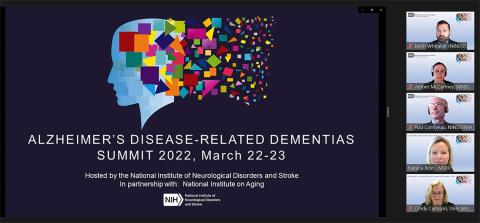Summit Refines ADRD Research Recommendations, Priorities

Alzheimer’s Disease-related dementias (ADRD)—which include frontotemporal degeneration (FTD), Lewy body dementia (LBD), vascular contributions to cognitive impairment and dementia (VCID) and multiple etiology dementias (MED)—are debilitating conditions that primarily occur among older adults, affect millions of Americans and exact an enormous toll on individuals, families, caregivers and society.
NINDS recently hosted a virtual summit on ADRD to help set national recommendations and priorities for research on the disorders. In preparation for the meeting, top researchers, physicians, experts and others in the field worked together in the months prior to assess, refine and, in some cases, update the earlier (draft) recommendations. They also evaluated progress that has been made and developed new timelines based on the current science in the field.
According to Dr. Roderick Corriveau, a program director in NINDS’s Division of Neuroscience and NIH lead for the summit, the goals of the conference were to present rationale for the draft recommendations, encourage discussion among stakeholders—including researchers, physicians, non-profit groups, patients and caregivers—and solicit feedback for consideration.
“This summit is the result of a lot of hard thinking of very smart people dedicated to the common goal of trying to figure out how we can better reduce the burden of ADRD,” said NINDS director Dr. Walter Koroshetz in opening remarks. “Although a virtual format is unavoidable during the pandemic, we hope this will increase participation and generate input from all corners of society impacted by dementia.”
Dr. Cynthia Carlsson, chair of the advisory council on Alzheimer’s research, care and services for the National Alzheimer’s Project Act (NAPA), gave an overview of the NAPA plan, which aims to overcome Alzheimer’s and ADRD by 2025. To help carry out the plan, both NIA and NINDS hold summits each year—with a rotation of triennial summits on AD, ADRD and dementia care—to develop and refine the multidisciplinary dementia research agenda and priorities for AD and ADRD.
This year’s summit—which registered more than 1,400 participants—was intended to build on progress made since the 2019 summit and to enhance those priorities.
“The national plan really bases a lot of its input on these important research summits,” said Carlsson, who is also the Louis A. Holland Sr., professor in AD at University of Wisconsin-Madison School of Medicine and Public Health. “These summits help develop ideas and move the work forward. Input from this summit is important as we shape the future research, clinical care and long-term support services.”

The meeting covered the overarching topics of MED and health equity in AD and ADRD; disease specific subjects including LBD, FTD and VCID; and special topics such as the impact of Covid-19 on AD and ADRD risk and outcomes and post-traumatic brain injury in AD/ADRD.
This year featured a video highlighting the experiences of people living with dementia and those caring for them.
“Scientists need to realize what a wealthy resource they have in their patients and care partners. Take advantage of this,” said Jim, a caregiver in the video. Jim cares for his wife Geri who has dementia. “If you don’t ask us [to help], you deny us the opportunity to feel valuable—to feel like we can help.”
At the end of the meeting, summit scientific chair Dr. Natalia Rost presented highlights and cross-cutting themes such as the need for more and better biomarkers and novel models, access to clinical trials to ensure equity and improved communication with caregivers regarding diagnosis and prognosis.
“Humanity, purpose, compassion—all of that has been inspiring throughout these 2 days,” said Rost, who is also chief of the stroke division at the Massachusetts General Hospital department of neurology. “I think we have our work cut out for us going forward. We have some immediate steps to do…There’s also long-term work to do and I promise you, we are not going to give up.”
Recommendations from the conference will be presented to the National Advisory Neurological Disorders and Stroke Council in September and then delivered to the NAPA Council.
